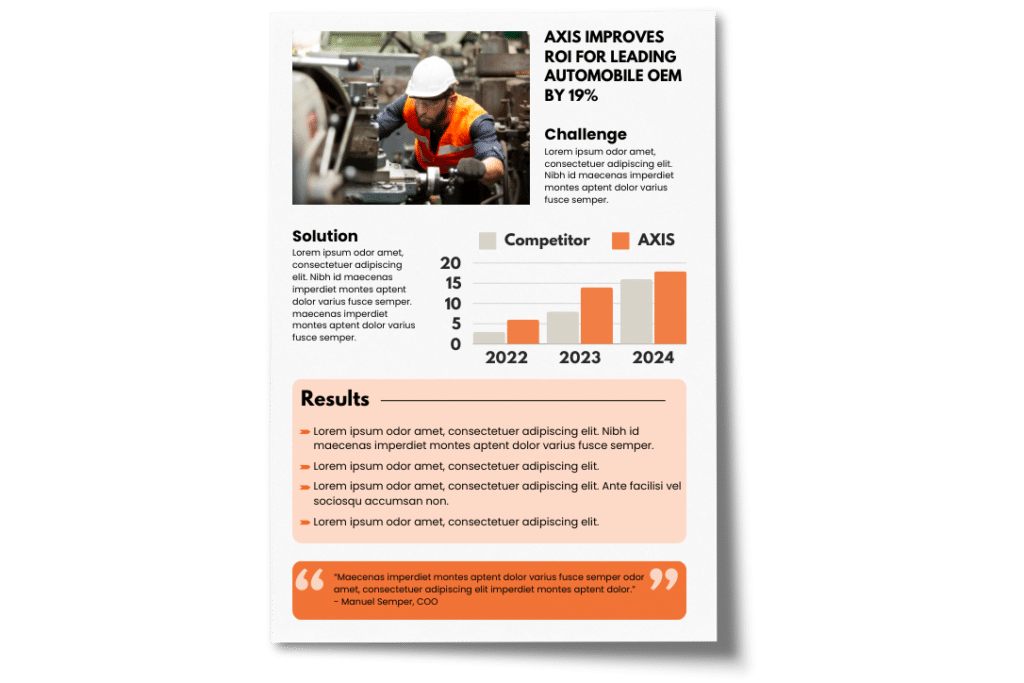Many manufacturers underestimate the power of SEO. They assume that because their industry is built on long-term partnerships and word-of-mouth, digital marketing doesn’t matter. But the reality is that industrial buyers, procurement managers, and engineers are searching for your products and services right now. If your website doesn’t show up in search results, those buyers will land on a competitor’s site instead.

SEO (Search Engine Optimization) ensures that when someone searches for a product or service you provide, your website appears at the top organic (non-paid or Google Maps) section. And the best part is that unlike traditional advertising or paid search ads that stop working the moment you stop paying, SEO continues to drive traffic for free. Once your pages rank well, they attract visitors month after month without ongoing costs.
If you’ve been hesitant about SEO because it seems expensive or complicated, here’s some good news: you don’t need an SEO agency or a massive budget to get started. With the right strategy, manufacturers can improve SEO on their own and see real results.
Let’s break down exactly how to do that.
1. Speak the Language of Your Buyers (Keyword Research for Manufacturers)
Your customers aren’t searching for vague marketing phrases like “innovative manufacturing solutions” or “state-of-the-art capabilities.” They’re using highly specific, technical language—phrases like “aluminum die casting for aerospace enclosures” or “custom injection molding for medical devices.” If your website doesn’t reflect the exact terminology your buyers are using, you’re less likely to show up in their search results.
For example, instead of relying on broad descriptions like “precision manufacturing,” a better approach would be something like “tight-tolerance CNC machining for titanium aerospace components.” That’s the kind of detailed phrase a procurement engineer is more likely to type into a search engine—and the kind that gets your site in front of the right people.
To find the right keywords, start by using Google’s auto-suggest feature. Type in a product name, and Google will automatically suggest common search queries related to it.
For deeper keyword insights, Semrush is a game-changer. With Semrush’s Keyword Magic Tool, you can discover thousands of related search terms, see their search volume, and identify which keywords your competitors are ranking for. The Competitive Analysis feature also allows you to track competitor rankings, find gaps in their strategy, and uncover opportunities to outrank them.
By using Semrush, you gain a data-driven edge that allows you to focus on the keywords that actually bring in buyers, not just traffic.

Another valuable source of keyword insights is your sales team. They hear customer questions daily, and those same questions should be answered on your website.
By strategically including these keywords in your product pages, blog posts, and FAQs, you increase your chances of ranking higher and attracting qualified leads.
2. Turn Keywords Into Clicks: Optimizing Your Product and Service Pages
Knowing what your buyers are searching for is the first step. The next is making sure those keywords live on your most important pages—specifically, your product and service pages.
Too often, manufacturing suppliers list a part number, a model name, or a single-line service description and call it a day. But if your content doesn’t reflect the search terms your customers use—materials, specs, tolerances, applications—those pages won’t rank, and buyers won’t find you.
Take a standard product page as an example. Rather than writing a vague description like “Part #8457 – Steel Bracket,” a stronger approach would be:
“Precision-formed steel brackets designed for heavy-duty racking systems in warehouse and distribution environments. Fabricated from hot-rolled steel and available with powder coating or zinc plating. Load-tested to 1,200 lbs with CAD drawings and custom hole patterns upon request.”
That level of detail is good for search engines—and even better for engineers who want confidence in what they’re sourcing.
The same goes for services. Instead of listing “machining services,” include keywords and context: “5-axis CNC machining for aerospace-grade aluminum, specializing in tight tolerances (±0.002”) for flight-critical components.”
You’re not just optimizing for rankings, you’re showing potential customers that you understand their industry and can meet their exact needs.
3. Fix the Tech Stuff (Site Speed, Mobile-Friendliness & Security)
While SEO has a lot to do with keywords and content, it’s also about how well your website functions. Even if you have the best content, slow load times or poor mobile usability can drive visitors away and hurt your rankings. Google prioritizes fast, secure, and mobile-optimized websites because they offer a better user experience.
While technical SEO can get a bit…nerdy complex, here are some simple technical SEO tips that you can follow to make an impact on your website. In fact, there are many free or low-cost SEO tools you can use to get started.
Start by checking your website’s speed using Google PageSpeed Insights. If your score is low, a good place to start is by compressing large images with TinyPNG. If you use a WordPress website, you can install a plugin, like Imagify, to compress all images on your website. Take it one step further, and convert your PNG and JPEG images to WebP for even faster loading.

If you’re more tech-savvy, you can minimize unnecessary scripts to reduce the time it takes to load the page. A one-second delay in page speed can reduce conversions by 7%, so every improvement counts. There are WordPress plugins that can identify and minimize excessive scripts.
Your site should also be mobile-friendly. Open it on a phone and navigate through it as if you were a customer. If the text is too small or the menus are hard to use, it’s time for a responsive design update.
Finally, make sure your site uses HTTPS (SSL security). If your URL starts with http:// instead of https://, ask your web hosting provider to install an SSL certificate. It’s a ranking factor and essential for trust.
4. Create Content That Answers Buyer Questions
Google rewards websites that provide in-depth, useful content. If you can answer buyers’ questions better than your competitors, your pages will rank higher.
Start by creating:
- Technical guides explaining product specs, tolerances, and best-use scenarios
- Comparison posts (e.g., “Stainless Steel vs. Galvanized Fasteners—Which One to Choose?”)
- Case studies showcasing real-world applications of your products or ROI of your services
- FAQs that address common customer inquiries
- Videos demonstrating product use and manufacturing processes

5. Earn High-Quality Backlinks (The Right Way)
Backlinks, when other websites link to yours, are one of the strongest SEO ranking factors. But not all backlinks are created equal. A link from an industry leader carries far more weight than a random blog.
To earn valuable backlinks:
- Offer guest articles to respected manufacturing publications, linking back to your website
- Ask suppliers and partners to list your company in their supplier directories
- Create shareable content like technical guides and case studies that industry sites will want to link to
- List your business in industrial directories and manufacturing associations
Avoid buying backlinks or joining link schemes. Google penalizes sites that use spammy tactics. Focus on earning links naturally by being a valuable resource in your industry.
5. Own Local SEO (Even if You Sell Nationally)
It’s a common misconception among manufacturers that local SEO only matters for businesses with a walk-in storefront or a regional-only customer base. In reality, even if you serve clients across the country, or even globally, manufacturing SEO strategies that include local optimization can still give you a major advantage. When buyers search for manufacturers or suppliers, Google often prioritizes local results, especially for organic searches that include terms like “near me” or a specific city or state.
To strengthen your local SEO presence, start by claiming and optimizing your Google Business Profile. Make sure your company name, address, phone number, website, and business hours are accurate and consistent with what appears on your website and across directories. A complete, active profile not only improves your visibility in local search results and Google Maps but also makes your business look more trustworthy.
Next, focus on generating and managing Google reviews. Encouraging satisfied customers to leave reviews strengthens your credibility and improves your chances of appearing in the top local search results. Integrating location-specific keywords throughout your website, especially on your homepage, About Us page, and service area pages—can further signal to Google that your business is relevant to users in that region.

Also consider getting listed in local manufacturing directories, regional trade associations, and your local Chamber of Commerce. These citations are a double-whammy! They help reinforce your geographic relevance and can generate valuable backlinks to your site.
Even if your primary customer base isn’t local, showing up in regional search results positions you as a reliable, accessible supplier—something many buyers still prioritize. Strong local SEO makes it easier for the right people to find you, wherever you are.
SEO Is an Investment That Pays Off
Unlike paid ads that stop working once your budget runs out, SEO is a long-term investment that continues driving website traffic over time. By optimizing your website, targeting the right keywords, and creating high-value content, you can increase visibility, attract more buyers, and generate leads without ongoing ad costs.
SEO for manufacturing companies is about showing up where your buyers are looking and giving them the information they need to choose you with confidence. When your website clearly communicates your capabilities, specialties, and value, it works around the clock to bring in qualified leads. Start applying these strategies now to strengthen your online presence, increase traffic, and win more business.
Need expert support? Our manufacturing SEO services are built to help you compete—and win—in search.



